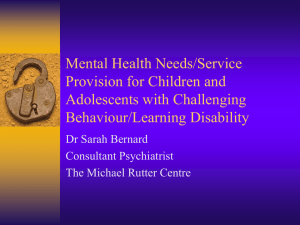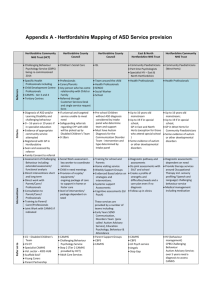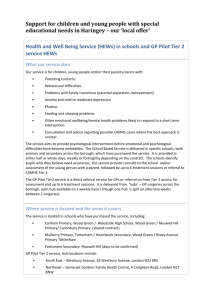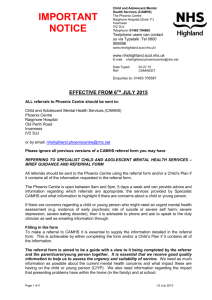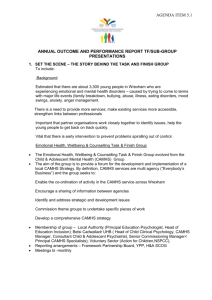Challenging Behaviour Psychology Service
advertisement
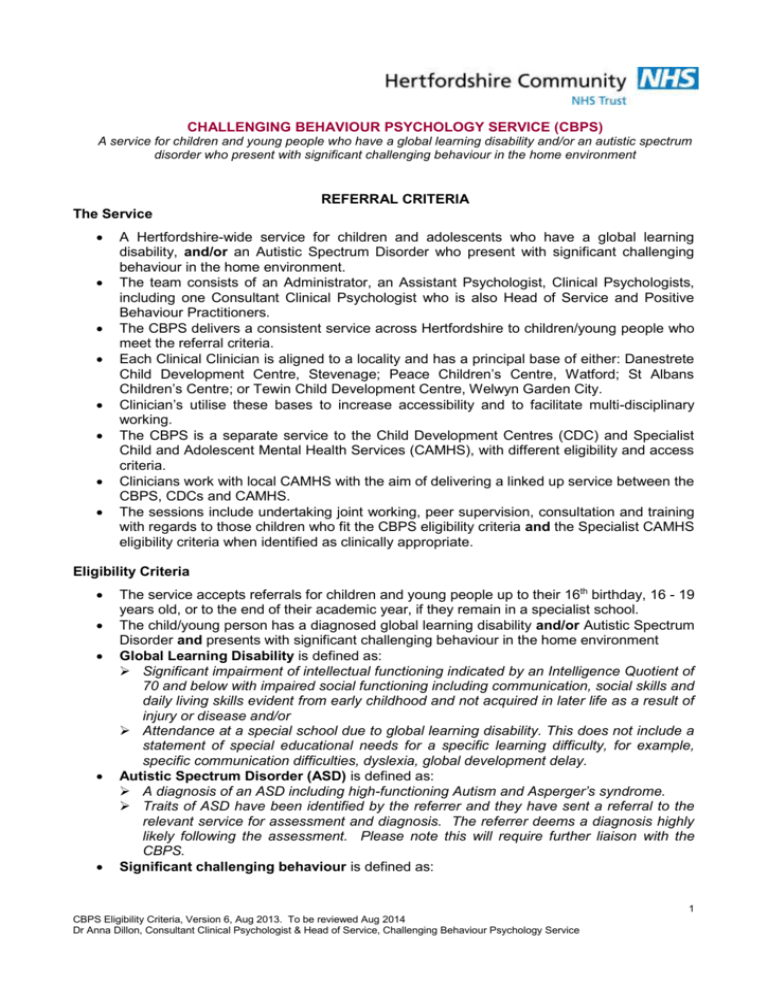
CHALLENGING BEHAVIOUR PSYCHOLOGY SERVICE (CBPS) A service for children and young people who have a global learning disability and/or an autistic spectrum disorder who present with significant challenging behaviour in the home environment REFERRAL CRITERIA The Service A Hertfordshire-wide service for children and adolescents who have a global learning disability, and/or an Autistic Spectrum Disorder who present with significant challenging behaviour in the home environment. The team consists of an Administrator, an Assistant Psychologist, Clinical Psychologists, including one Consultant Clinical Psychologist who is also Head of Service and Positive Behaviour Practitioners. The CBPS delivers a consistent service across Hertfordshire to children/young people who meet the referral criteria. Each Clinical Clinician is aligned to a locality and has a principal base of either: Danestrete Child Development Centre, Stevenage; Peace Children’s Centre, Watford; St Albans Children’s Centre; or Tewin Child Development Centre, Welwyn Garden City. Clinician’s utilise these bases to increase accessibility and to facilitate multi-disciplinary working. The CBPS is a separate service to the Child Development Centres (CDC) and Specialist Child and Adolescent Mental Health Services (CAMHS), with different eligibility and access criteria. Clinicians work with local CAMHS with the aim of delivering a linked up service between the CBPS, CDCs and CAMHS. The sessions include undertaking joint working, peer supervision, consultation and training with regards to those children who fit the CBPS eligibility criteria and the Specialist CAMHS eligibility criteria when identified as clinically appropriate. Eligibility Criteria The service accepts referrals for children and young people up to their 16th birthday, 16 - 19 years old, or to the end of their academic year, if they remain in a specialist school. The child/young person has a diagnosed global learning disability and/or Autistic Spectrum Disorder and presents with significant challenging behaviour in the home environment Global Learning Disability is defined as: Significant impairment of intellectual functioning indicated by an Intelligence Quotient of 70 and below with impaired social functioning including communication, social skills and daily living skills evident from early childhood and not acquired in later life as a result of injury or disease and/or Attendance at a special school due to global learning disability. This does not include a statement of special educational needs for a specific learning difficulty, for example, specific communication difficulties, dyslexia, global development delay. Autistic Spectrum Disorder (ASD) is defined as: A diagnosis of an ASD including high-functioning Autism and Asperger’s syndrome. Traits of ASD have been identified by the referrer and they have sent a referral to the relevant service for assessment and diagnosis. The referrer deems a diagnosis highly likely following the assessment. Please note this will require further liaison with the CBPS. Significant challenging behaviour is defined as: 1 CBPS Eligibility Criteria, Version 6, Aug 2013. To be reviewed Aug 2014 Dr Anna Dillon, Consultant Clinical Psychologist & Head of Service, Challenging Behaviour Psychology Service Behaviour of such an intensity, frequency or duration as to threaten the quality of life and/or the physical safety of the individual or others and is likely to lead to responses that are restrictive, aversive or result in exclusion (BPS & RCP, RCSALT 2007). The child/young person must be in the registered population for Hertfordshire. An appropriate community service (universal or targeted), such as a parenting group, has been attempted without success indicating a level of complexity appropriate to the service. The child/young person must have at least been seen and assessed by the referrer prior to referring on to the CBPS. The young person or family consent to the referral. Who can refer? Referrals are accepted from: Child Development Centre Professionals i.e. Occupational Therapists, Paediatricians, Physiotherapists, Specialist Nurses and Speech and Language Therapists and School Nurses working in special schools. Specialist Child and Adolescent Mental Health Service Professionals. This includes those working in the: Adolescent Drug and Alcohol Service, Adolescent Outreach Team, Forest House Adolescent Unit, Harper House Children’s Services and Specialist CAMHS Clinics. Tertiary Services, including national centres How to refer There is a single point of referral Referrals must be made using the CBPS referral form Completed referral forms can be: faxed to the service: 01727 891102, or posted to: Challenging Behaviour Psychology Service, St Albans Children’s Centre, Church Crescent, St Albans, Hertfordshire, AL3 5JB. Please note that failure to use the referral form or to fully complete the referral form will result in delays to processing the referral and therefore result in a delay to the child/young person’s care pathway. Interventions In implementing all interventions the CBPS endeavours to liaise closely with all professionals involved in the child/young person’s care alongside parents/carers(s). The CBPS works in a range of appropriate settings. The CBPS provides: Assessment of challenging behaviour including extended assessment and/or detailed functional analysis to gain an understanding of the challenging behaviour. Direct interventions involving a range of short-term and long-term interventions, including high intensity interventions, in order to reduce challenging behaviour. This includes working with the parent/carer and/or relevant professional without the child/young person present. Consultation to parent/carer and/or to relevant professionals both face to face and by telephone. Training to parent/carer and/or to relevant professionals, this includes providing a training programme with regards to the prevention of challenging behaviour. Medication If the use of medication is identified to support the CBPS interventions and the child/young person is referred by a CDC professional and remains ‘open’ to a CDC professional, the Community Paediatrician will provide the appropriate assessment with regards to medication and prescribe and monitor as appropriate and in accordance with the CDC 2 CBPS Eligibility Criteria, Version 6, Aug 2013. To be reviewed Aug 2014 Dr Anna Dillon, Consultant Clinical Psychologist & Head of Service, Challenging Behaviour Psychology Service guidance. If the Community Paediatrician requires support in the use of medication for the child/young person a referral can be made to Harper House Children’s Services. If the use of medication is identified to support the CBPS interventions and the child/young person is referred by a CAMHS’ professional and remains ‘open’ to CAMHS the CAMHS Psychiatrist will provide the appropriate assessment with regards to medication and prescribe and monitor as appropriate and in accordance with Specialist CAMHS’ guidance. If the CAMHS Psychiatrist requires support in the use of medication for the child/young person a referral can be made to Harper House Children’s Services. If the use of medication is identified to support CBPS interventions and the child/young person is not ‘open’ to either the CDC or CAMHS the CBPS will make a referral to Harper House Children’s Services with the aim of the provision of appropriate assessment, prescription and monitoring of medication as appropriate and in accordance with Hertfordshire Community Trust guidance. Discharge Once work has finished either through clinical decision or family decision the child/young person will be discharged back to the referrer or GP. If the referring service is no longer involved in the child/young person’s care, for example, when CAMHS have referred following a Choice¹ appointment with a decision of no further involvement from CAMHS, the child/young person will be discharged back to the care of the original referrer to CAMHS such as the GP. A letter summarising the work will be sent to the family and copied to the GP/referrer and relevant professionals with consent. When is it not appropriate to refer? The following concerns/issues are not appropriate to refer: Mental health issues as the primary concern. The CBPS is not a ‘mental health’ service. Children and young people who present with severe, complex and/or persistent psychological and emotional difficulties should be referred to Specialist CAMHS utilising the CAMHS guidance, eligibility and access criteria. If a child’s presentation meets CAMHS criteria and CBPS criteria joint work may be undertaken. Initial diagnostic assessments including diagnosis of learning disabilities and Autistic Spectrum Disorders. Legal issues relating to parental separation/disputes. Child/neglect abuse as the primary issue - please refer to the Hertfordshire Child Protection pathway. Usual child response to normal life events e.g. parental divorce, bereavement. Sleeping problems, toileting difficulties & feeding problems as the primary concern. Transition issues. Chronic disease. Physical Disability in the absence of a learning disability and/or autistic spectrum disorder. Bereavement. Sibling support. Neonatal support. CB education/school specific In order to aid identification of gaps in services for children and young people alongside regular service evaluation, the CBPS participates in multi-disciplinary forums and informs relevant commissioners of the gaps in service identified. ¹A one-off appointment where CAMHS meet with the family and child/young person to help them choose, using our expertise and their experience, what services or interventions they feel would be helpful with their concern. 3 CBPS Eligibility Criteria, Version 6, Aug 2013. To be reviewed Aug 2014 Dr Anna Dillon, Consultant Clinical Psychologist & Head of Service, Challenging Behaviour Psychology Service (CAMHS, Hertfordshire Partnership Trust) 4 CBPS Eligibility Criteria, Version 6, Aug 2013. To be reviewed Aug 2014 Dr Anna Dillon, Consultant Clinical Psychologist & Head of Service, Challenging Behaviour Psychology Service

